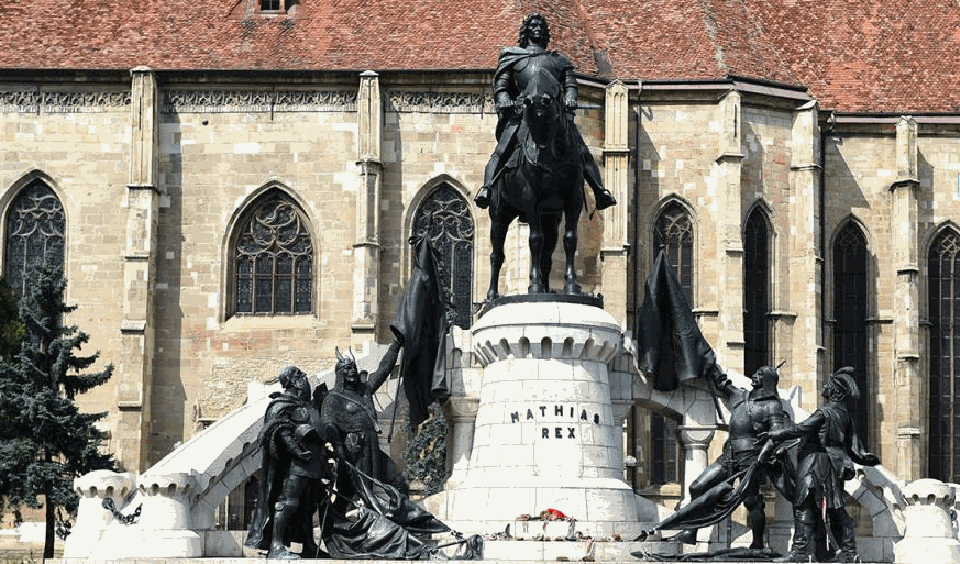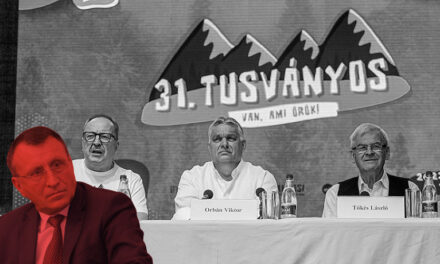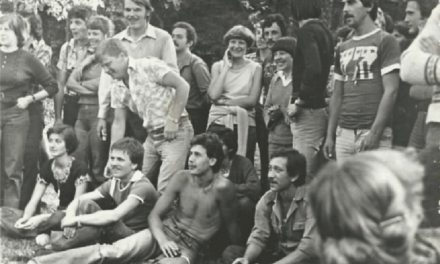It happened on a November night drenched in full moon light that the statue of Matthias standing in the main square of Cluj-Napoca stretched out a large, discreet, in the middle of a ghostly crackle.
The king looked around, admired the well-known (but beautifully renovated) St. Michael's Church, the not-at-all-known (but placed there with a good sense of proportion) fairground Ferris wheel, then he began to neigh his lovely horse, but apparently the enchanting moonlight did not affect him.
So he got rid of it and started for the city on foot. He got himself a disguise from a shop window (at the cost of some clanking) according to his good habit, then entered a room from which he saw the world filtering out. It could be some kind of inn, he thought to himself, seeing the many people drinking, hanging out, and playing music. He asked for a cup of wine (the innkeeper understood the king's language), sat down in a corner and listened to what the people were talking about. More precisely, the peoples whose language he understood, because they also spoke other languages there.
He followed word for word, as is usual at this time. An unusual word caught the king's ear: minority. At first he thought that these offspring had such a strange expression of insignificance, but he slowly realized that they were thinking of themselves. For Hungarians. That they are in the minority here in Transylvania. And they want to protect themselves somehow, if they are already in such a situation that they have no borders of their own, they have been separated from Magyarhon, and they have neither parippa, nor weapons, nor the right, not only to recruit a black, but also a dirty gray army.
The disguised monarch also learned that in this new world there is a very large kingdom (hey, like mine at the time, he thought with a big sigh, or maybe even bigger), whose capital is Brussels, and there the living and dead, including the fate of Transylvanian Hungarians who were forced into the minority. King Matthias was always a man ready for action. He thought for a while, then he met a smart girl (it wasn't difficult, since he was a handsome man), he got the necessary information, sold his sword (on the one hand, as he found out, nowadays matters are not handled with iron in the civilized (!) world, on the other hand, a large pile he got money for it on the black market of artefacts, much more than the annual tax of a county), he acquired some important documents, orderly clothes, then he got an iron pair and galloped off to Brussels, where the great, great noble council works.
Of course, he knew from the start that he couldn't just walk into the council chamber. There are rules in this new world too. But he also knew that there was no need for that. Through his spies (that's what money does, right) he found out in which inn the councilors gather to talk and draw up plans, and he also set them up nicely. He introduced himself as a fabulously rich (parental) landowner (it has been reported that the barons of Brussels love land, wherever it is) and invited everyone to a barrel of good wine.
As is usually the case at this time, tongues were slowly wagging. The king skillfully directed the word to the minorities. The powerful councilors nodded enthusiastically: the Grand Mufti of Brussels yes, yes, of course, how could it support the minorities, in fact, it is ready to bring to its knees anyone who does not follow the order. They protect all minorities, no matter how small, even those that don't actually exist, added one of the councilors. This matter is so important! And what about the Transylvanian Hungarians, asked the king. There was silence.
Who are they, asked a pope-eyed gentleman. You know, they live there, in Transylvania. Silence. Sorry, in Romania. Yes, many lords nodded.
You know, they have been knocking on your doors for years with a minority protection package. Yes, the many potentates nodded again. Well, the thing with those Romanian citizens with what kind of lips, said the gentleman with glasses, is that we don't understand what they want. After all, they are fine there, in Romania. There's nothing wrong with them. And anyway, from here in Brussels, we don't interfere in Romania's domestic affairs. We are not dictators.
I understand, the king nodded. But if they can intervene in the affairs of the other minorities, and in fact, they want to bring to their knees anyone who does not follow the order from Brussels, why not these Transylvanian Hungarians (and I assume there are other similar minorities living in the old Europe, without their own borders)? Please, answered the high-powered councilors, this question is extremely unjustified, incidental and not timely. Let's talk about your lands, my dear sir. How much?
At the end of the palaver, which lasted into the night, King Matthias bid farewell to the Brussels powers, mounted the iron rail and jogged back to Cluj. He arrived in the city late at night, walked into the center, stopped by the smart girl on the way, changed his clothes, said goodbye to her nicely, then walked out into the main square and in the full moon light gave his horse such a slap that it started bucking like that. The king caught him and galloped off.
According to stray news, a raven-black army is gathering somewhere to protect this small Hungarian minority in Transylvania.
Featured image: Euroastra












